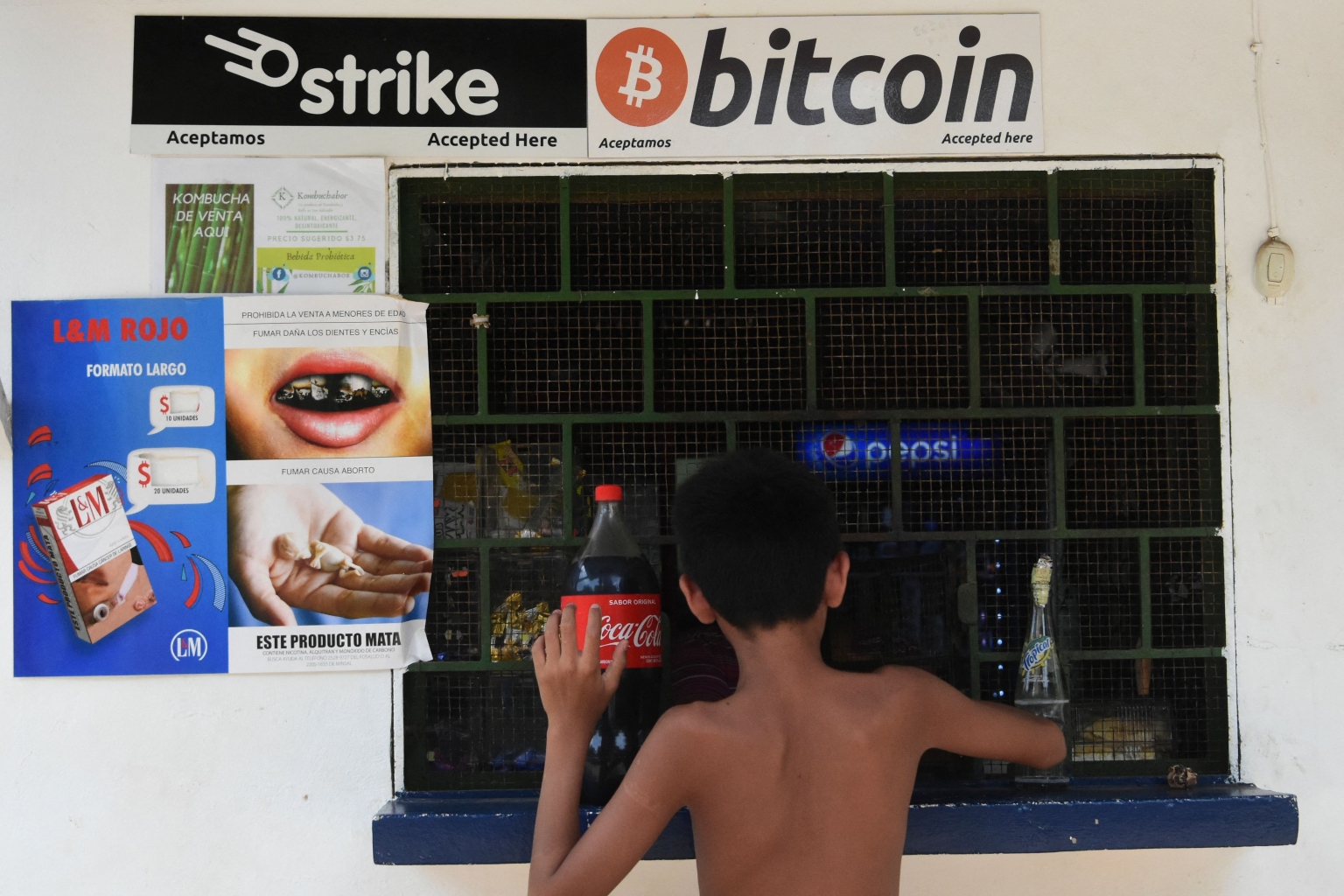El Salvador becomes first country to adopt Bitcoin as legal tender
Reactions mixed in capital; President says move will help citizens abroad remit money
Sign up now: Get ST's newsletters delivered to your inbox

A store in El Salvador that accepts payment in Bitcoin. Under the country’s new law, Bitcoin must be accepted by firms when offered as payment for goods and services, and tax contributions can also be paid in the cryptocurrency. The use of Bitcoin will, however, be optional for individuals and the United States dollar will also continue as legal tender.
PHOTO: AGENCE FRANCE-PRESSE
Follow topic:
SAN SALVADOR • El Salvador became the first country to adopt Bitcoin as legal tender after Congress on Wednesday approved President Nayib Bukele's proposal to embrace the cryptocurrency.
With 62 out of 84 possible votes, lawmakers voted in favour of creating a law to adopt Bitcoin, despite concerns about the potential impact on El Salvador's quest to seek a more than US$1 billion (S$1.3 billion) programme with the International Monetary Fund (IMF).
Bitcoin, in response, enjoyed its best day in two weeks, rising as much as 6 per cent to US$35,200.
Mr Bukele has touted the use of Bitcoin for its potential to help Salvadorans living abroad to send remittances back home, while saying the United States dollar will also continue as legal tender.
In practice, El Salvador does not have its own currency.
"It will bring financial inclusion, investment, tourism, innovation and economic development for our country," Mr Bukele said in a tweet shortly before the vote.
He later said he had instructed state-owned geothermal electric firm LaGeo to develop a plan to offer Bitcoin mining facilities using renewable energy from the country's volcanoes.
He said the idea was to build a Bitcoin mining hub around the country's geothermal potential. He also said citizenship would be offered to those with evidence they had invested in at least three bitcoins.
The use of Bitcoin will be optional for individuals and will not bring risks to users, Mr Bukele said, with the government guaranteeing convertibility to dollars at the time of transaction through a US$150 million trust created at the country's development bank Bandesal.
Under the law, Bitcoin must be accepted by firms when offered as payment for goods and services. Tax contributions can also be paid in the cryptocurrency.
"If you go to a McDonald's or whatever, they cannot say we're not going to take your Bitcoin. They have to take it by law because it's legal tender," Mr Bukele said.
Its use as legal tender will begin in 90 days, with the Bitcoin-dollar exchange rate set by the market. Mr Bukele said the government and central bank did not currently hold any Bitcoin.
In the capital, San Salvador, reactions were mixed.
"How am I going to agree with this? I know nothing about it, you need to understand your currency," said Ms Estela Gavidia, recalling the loss of purchasing power many poor people suffered when the dollar was adopted in 2001.
Cryptocurrency supporters said the move legitimises the emerging asset, but its impact on Bitcoin regulation, taxation or adoption in other countries remains to be seen.
Mr Bukele had said he would meet the IMF yesterday to discuss the Bitcoin law, among other issues. He said in setting up the meeting, he had tried to explain that the shift was "not going to change our macroeconomics".
"The market will now be focused on adoption through El Salvador and whether other nations follow," said Mr Richard Galvin, chief executive of crypto fund Digital Asset Capital Management. "This could be a key catalyst for Bitcoin over the next two to three years."
Emerging economies - where bank penetration is much lower than in developed countries and reliance on money transfers from abroad much higher - have quickly warmed to cryptocurrencies.
Outside the US, countries with the highest crypto production and trading volumes are developing nations, including China and India, according to Bank of America (BofA).
Mr Bukele said some 70 per cent of people in El Salvador lack access to traditional financial services.
But the use of digital currencies in general can also pose risks for dollarised economies, said analysts. "The root cause of dollarisation is high local inflation, which could worsen, too, if digital currencies prove inflationary," said Mr David Hauner at BofA.
El Salvador relies heavily on money sent back from workers abroad. World Bank data showed remittances made up around a fifth of gross domestic product in 2019, one of the highest ratios in the world.
The cryptocurrency offers, in theory, a quick and cheap way to send money across borders without relying on remittance firms.
Converting local currencies to and from Bitcoin often relies on informal brokers, while trading often demands technical knowledge.
El Salvador will promote training and mechanisms to allow access to Bitcoin transactions, the law said.
Experts warn that Bitcoin facilitates illicit uses, but Mr Bukele brushed off the fears, saying criminals already use US dollars and other assets to launder money.
REUTERS

